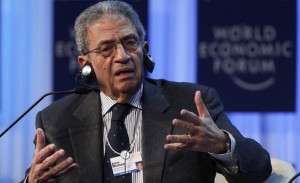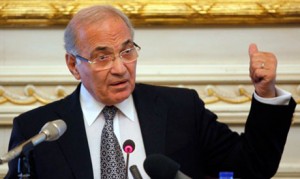 Egypt’s curious gallery of presidential candidates reveals how much the nation has changed yet how deeply it still echoes with voices connected to the repressive rule of deposed President Hosni Mubarak.
Egypt’s curious gallery of presidential candidates reveals how much the nation has changed yet how deeply it still echoes with voices connected to the repressive rule of deposed President Hosni Mubarak.
The country’s revolution brought new faces, including Khairat Shater, onetime political prisoner now running as a candidate for the Muslim Brotherhood. But the revolt failed to sweep away prominent, if shadowy, challengers from the past, most notably Omar Suleiman, the former leader’s spymaster and confidant.
The presidential race lays bare today’s volatile Egypt: a battleground between ascending Islamists and the remnants of a regime seeking to conjure a sense of stability in a land troubled by crime and economic turmoil. The contest between the two forces sharpened after the revolution’s young activists failed to inspire Egyptians with a political alternative.
“If we have three members of Mubarak’s regime running for office after the revolution, then it is obvious the revolution remains unfinished,” said Bashir Abdel Fattah, editor of Democracy magazine. He added that the race reflected Egypt’s “uncertain and inexperienced political climate.”
The grass-roots reach of the Muslim Brotherhood, which controls nearly 50% of parliament, makes Shater, a multimillionaire, a strong contender in next month’s election. Another popular Islamist is Abdel Moneim Aboul Fotouh, a moderate who was expelled from the Brotherhood when he chose to run as an independent.
Suleiman’s appearance has revived memories of last year when, as Mubarak’s vice president, he stepped on the wrong side of history and disappeared after failing to buttress the regime against the popular revolt. His candidacy is not expected to significantly recast the dynamics of the race. but it may skim support from two other Mubarak-era officials: former Foreign Minister Amr Moussa, who is leading in the polls, and former Prime Minister Ahmed Shafik.
The retired intelligence chief’s campaign has outraged Islamists and reminded the country that many things look the same despite a rebellion that gripped the Arab world and promised a new political current. Aboul Fotouh, who was jailed by Mubarak’s regime, said Suleiman’s bid “insults those who have sacrificed their lives to put an end to the police state.”
In an interview published Monday, Suleiman told Al Akhbar newspaper that he received “death threats and messages saying, ‘We will take revenge’ from members of the Muslim Brotherhood and other Islamists groups.”
The Egyptian Independent newspaper described the contest as a “fast-changing presidential race that has the unpredictable turns of a soap opera.” Ahram Online said: “Who will run and who will be disqualified, and what is the fate of Egypt?”
Suleiman submitted his campaign papers over the weekend amid fanfare. Commentators suggested he was the choice of the ruling military council, even as he trails Shater, Moussa and Hazem Salah abu Ismail, an ultraconservative Islamist who may be forced from the race in light of revelations that his deceased mother was a U.S. citizen.
The 75-year-old Suleiman is the strongest link to Mubarak, giving Egyptians, many of whom fret over the nation’s instability, a clear vote against an Islamist-controlled government and the rebellion that disrupted their lives.
“I fear the monopoly of the Brotherhood and the Islamists,” said Sherif Hussein, a 28-year-old engineer and Suleiman supporter. “During Mubarak’s time we were not financially struggling like we are now…. Suleiman has great international and regional ties and with his connections can lure foreign investments back in no time.”
 The competing images of Shater and Suleiman couldn’t be starker. Imprisoned by Mubarak for years, Shater, who has been meeting with U.S. officials, ran his corporations from a jail cell while financing the Brotherhood. Suleiman was Mubarak’s chief international negotiator and a symbol of the secret police and security forces that persecuted Shater and thousands of other Islamists and dissidents.
The competing images of Shater and Suleiman couldn’t be starker. Imprisoned by Mubarak for years, Shater, who has been meeting with U.S. officials, ran his corporations from a jail cell while financing the Brotherhood. Suleiman was Mubarak’s chief international negotiator and a symbol of the secret police and security forces that persecuted Shater and thousands of other Islamists and dissidents.
Today, Shater is closer to the center of power. But many Egyptians are angry at the Brotherhood for running Shater after promising not to enter a candidate, to calm fears of Islamist hegemony. There is the prospect he could be disqualified from the race as a felon; the Brotherhood entered a backup candidate in the event that happens.
 The Brotherhood also faces intense criticism over its control of a panel to draft a constitution. Liberals, secularists, Christians and a leading Muslim institution are boycotting the constituent assembly. The acrimony is another recurring sign that the Brotherhood, Egypt’s most potent and revered opposition for decades, has stumbled as it attempts to lead.
The Brotherhood also faces intense criticism over its control of a panel to draft a constitution. Liberals, secularists, Christians and a leading Muslim institution are boycotting the constituent assembly. The acrimony is another recurring sign that the Brotherhood, Egypt’s most potent and revered opposition for decades, has stumbled as it attempts to lead.
“The Brotherhood has lost a lot of credibility and their performance in parliament is yet to convince many,” said Fattah, the magazine editor. “It is not likely that they will win many presidential votes outside the group.”
Part of the problem is the ruling military council, which has promised to hand power to a civilian government by the end of June. The Brotherhood and the military have been cooperating for months, but recent strains have upset the relationship. Both sides want to protect their power, especially the military, which has vast economic interests.
 The new president will immediately encounter this uneasy balance.
The new president will immediately encounter this uneasy balance.
“Everything looks gloomy and I don’t know what the future of the country and the revolution will be like,” said Ahmed Saied Dahan, a banker. “The military did everything possible to make Egyptians hate the revolution and what it stands for. And now many people are willing to go back to Mubarak’s days in the shape of Suleiman, Moussa or Shafik.”
LA Times

Leave a Reply
You must be logged in to post a comment.